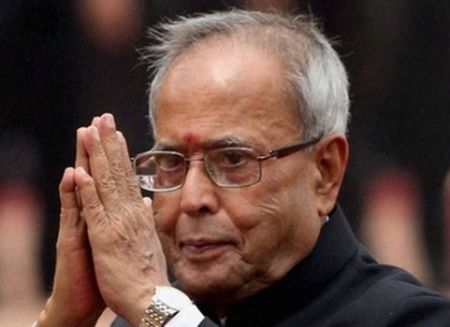
Amidst a wave of rising intolerance, President Pranab Mukherjee on Monday expressed serious apprehensions over whether tolerance and acceptance of dissent are on the wane in the country.
"Humanism and pluralism should not be abandoned under any circumstance. Assimilation through receiving is a characteristic of Indian society. Our collective strength must be harnessed to resist evil powers in society," Mukherjee said.
Addressing a gathering organised by Nayaprajanma, a local weekly newspaper in Birbhum, he expressed apprehension about "whether tolerance and acceptance of dissent are on the wane?"
He reminded the audience of the teachings of Ramakrishna Paramhansa 'Jato Mat Tato Path' "As there are a number of beliefs, there are a number of ways".
"Indian civilisation has survived for 5,000 years because of its tolerance. It has always accepted dissent and differences. A large number of languages, 1,600 dialects and 7 religions coexist in India. We have a Constitution that accommodates all these differences," the President said.
The President's strong words on the need to maintain pluralism and dissent in the society come against the backdrop of series of hate incidents including in Mumbai where Bharatiya Janata Party ally Shiv Sena forced cancellation of a music concert by Pakistani legend Ghulam Ali and talks between Indian and Pakistani cricket board Chiefs and blackened the face of Sudheendra Kulkarni.
Less than a fortnight ago against the backdrop of Dadri lynching, the President made a strong appeal for maintaining the core civilisational values of diversity, tolerance and plurality have kept India united for centuries which he said cannot be wasted.
The President's strong condemnation came on a day when an independent MLA from Jammu and Kashmir Sheikh Abdul Rashid was the target of a fringe Hindu outfit which threw ink and mobil oil on him at the Press Club in Delhi protesting against the beef party he held in Srinagar earlier this month. He was also beaten up in the state assembly by BJP MLAs.
Greeting people on the eve of Durga Puja celebrations, Mukherjee expressed the hope that "Mahamaya -- the combination of all positive forces would eliminate the Asuras or divisive forces."
Mukherjee recalled that recently when he had visited three countries -- Jordan, Palestine and Israel -- in West Asia where everyone knows unrest is.
"What surprised me was that the leaders of the three countries, the students and the teachers of all the three well-known universities of those countries asked me a question.
"What is the chemistry behind such strong nationalism in India where there is so much variety in respect of religion, race, languages, anthropological features, etc? I’m not sure why they asked such a question. May be the ongoing unrest had prompted them to do so," he said.
The basis of the national integration of this country is tolerance, he added.
"This question has also risen in the mind of the people here too. The essential part of the Indian civilisation and culture is its pluralism. Our bondage is strong because of tolerance … to accept the other’s religion and other’s opinion."
"In any situation we cannot destroy our pluralism and tolerance. We celebrate our variety, we accept the views of others. Sometimes a question comes to our mind -- Are we on the right track? Without tolerance our civilisation would not have continued for 5,000 years," he said.









